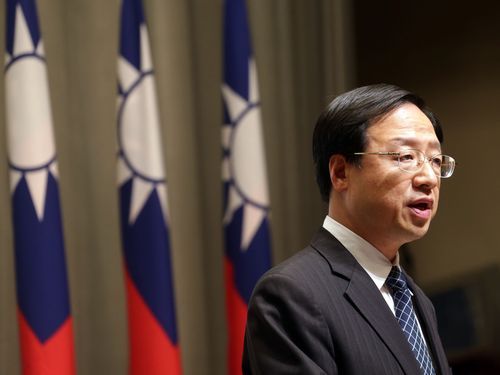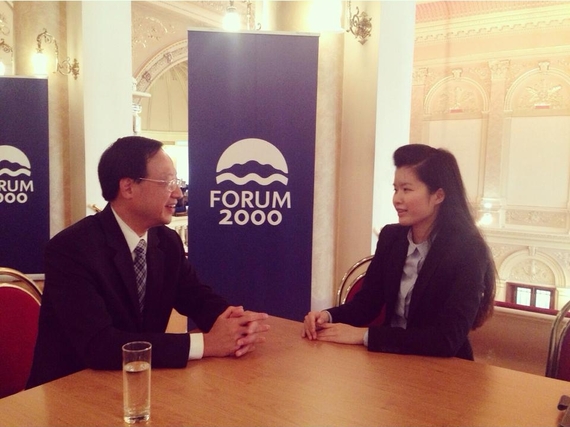Dr. Jiang is currently a Senior Advisor to the President of the Republic of China (Taiwan). He served as Premier of the R.O.C. from 2013 to 2014. He was also Vice Premier, Minister of the Interior and Minister of the Research, Development and Evaluation Commission branch of the Executive Yuan. Dr. Jiang discusses how he transitioned from working in education to politics and shares his advice to young people across the world when it comes to pursuing a career in politics.
- As told to Lan Anh Vu.
Why I pursued a career in politics
I was a political theorist before I entered public service in the Central Government. I earned my PhD degree in 1993 at Yale University, and then I went back to Taiwan to teach political theory at National Taiwan University for seventeen years. At that time, I did not have any idea that I would be involved in politics one day. However, in 2008, I was invited by the newly elected President of the Republic of China (Taiwan) - President Ma Ying-jeou asked me to join the government. My first response was: ''No, thank you very much. I am not interested in politics, because I prefer to be a scholar.''
President Ma Ying-jeou invited me again and asked me to reconsider the possibility. Finally, I decided to give him a shot and try being part of the government. The primary reason is that, for a political theorist it would be wonderful to experience the reality of politics. It is also a good opportunity for a citizen to contribute to his own society, to pay tribute to his parents. In addition to that, I also had some political ideas that I wished to implement or actualize in politics. And what were those? I wanted to reach young citizens and try to create some kind of harmony between the political parties, to show to our people that the government can be uncorrupted. So, I finally made up my mind to engage in political life. Since 2008, I served the first Minister of Research, Development and Evaluation Commission, then Minister of Interior, Vice Premier and finally the Premier of Central Government.
The challenges and opportunities of politics
Politics not only challenges human nature, which limits one's senses and imagination, but it also challenges one's patience and capacity to handle pleasures of every kind. However, the opportunity that politics can provide is a real sense of creating history and being part of the important moments in history. Max Weber once said that to be engaged in politics, one will experience the feeling of making or changing the history. This is not a feeling that you can easily have in other professions. Just think about this scenario: You are the leader of a country and you will be able to make a decision which will affect so many people's lives, and suddenly you realize that your responsibility is enormous. So, I think this is a unique opportunity that politics can provide for any statesman.
What I have learned
In the past seven years, I have experienced some very important political moments that a political theorist would not have the opportunity to have. Reflecting upon the past few years, I recognize that it was worthwhile. I have also learned a lot from the political experiences of real life. I came to realize that some pieces of the great thinkers' political philosophies are true, while other pieces are not so realistic.
When you go into politics, you will find there are so many people who are in great need of help from the government, but they think differently and they cannot be as so-called rational and intellectual as one might like them to be. I came to realize that politics is not only about reason or rationality, but it is also about patience and emotions.
To be a good statesman, you have to be very cool in your mind, but very patient in your heart.
So, I think this is something an intellectual cannot easily understand if he just remains a scholar.
How would I want to be remembered for those years when I was Premier
I think it's up to the next generations and history. Personally, I hope to be seen as a person who is faithful to my own convictions and ideas. I tried to be a clean politician; I rejected any temptation of corruption; and, I tried very hard, almost working twenty-four hours a day, seven days a week for the public good rather for my personal interest. I also wish to be remembered as a scholar or intellectual, who is very idealistic in his vision but pragmatic in his actions.
What I believe makes a strong leader and how young people should equip themselves in order to compete for upper management positions
First of all, he must have some knowledge, and ideas about public affairs; what is happening and how it should be handled. He cannot jump into political life simply out of impatience. Secondly, he needs to know how to coexist and cooperate with other people, especially with people who disagree with him. He needs to know how to be tolerant, inclusive, sympathetic, and charismatic. Finally, our next generation should be well-prepared with new terminology not only in social media, but also in international knowledge. We need to have a broad perception of the whole world. We are not to be a politician of the country, but a statesman of the world.
Advice for young people out there, who would like to follow in my footsteps as a politician
There is a wonderful essay written by Max Weber called 'Politics as a vocation'. It talks quite a lot about how a young student should be prepared if he really wants to engage in politics. I totally agree with Weber. That is, if you want to be involved in the process of politics, you have to realize in advance that political life is very difficult. Sometimes, you will face a situation that makes you so hopeless and so confused about whether or not it was worth it for you to sacrifice so much, and whether or not it is possible to achieve what you wanted at the beginning. However, Max Weber said that even with this kind of disillusionment, you can still stand very firmly. Nevertheless, I stand here and I know what I am doing. I think this is kind of a calling from very deep inside of you - passion. It is a kind of feeling that cannot be easily disillusioned.
Politics is the art of the impossible; it is a very difficult career. Nevertheless, it is something still worthwhile.
This interview has been condensed and edited for clarity.


